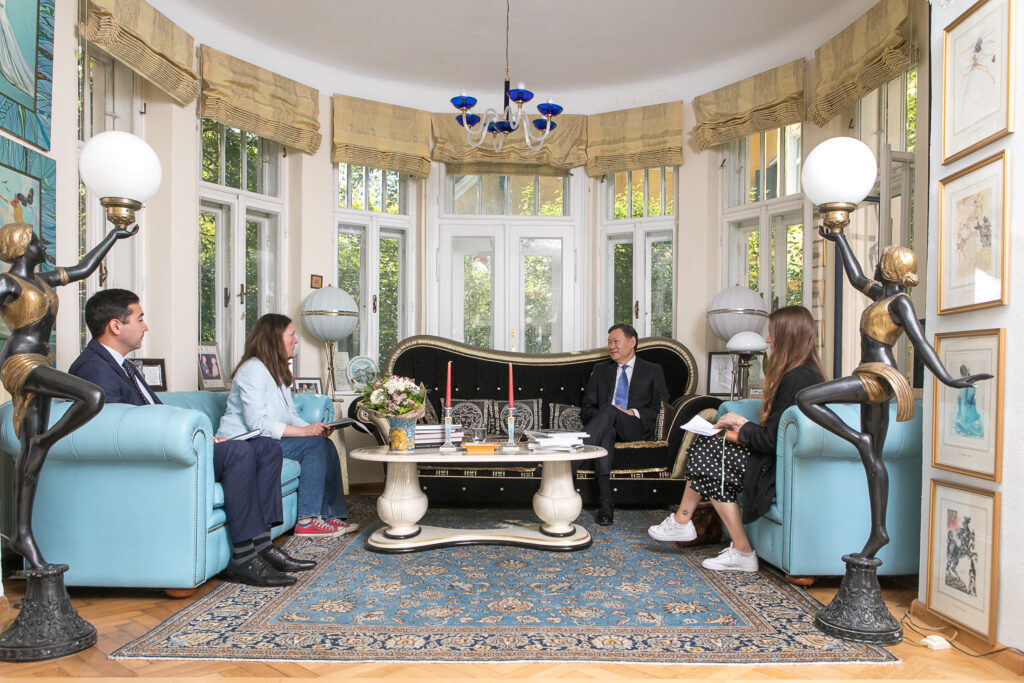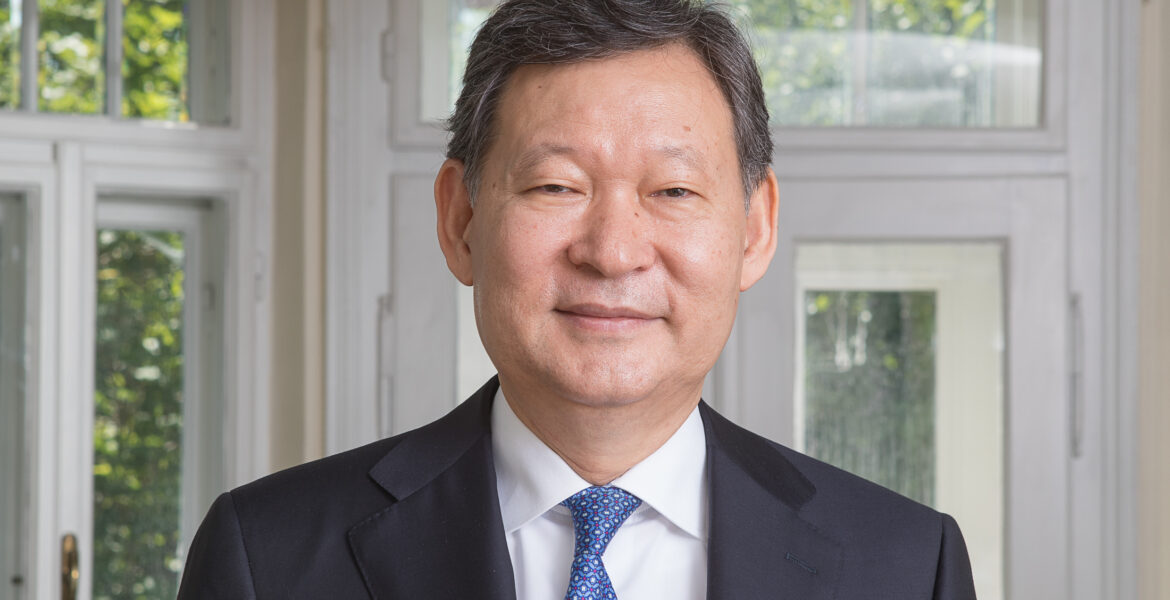SOCIETY Magazine spoke with H.E. Kairat Umarov, Ambassador of Kazakhstan to Austria, about potential fields of cooperation, future alliances and his country’s transformation.
Kazakhstan was the first country in Central Asia with which Austria established diplomatic relations. How are bilateral relations today and where do you as Ambassador see the greatest potential for cooperation?
Bilateral relations between our two countries are excellent: Kazakhstan is actually the only country in the area which has an Austrian Embassy and trade representation. Respectively, here in Austria we have seven honorary consuls who are constantly cultivating our connection. Laudably, the tie between the two countries is not only established on a capital-to-capital level, but a lot of networking is happening on a regional level as well. As Ambassador, I would like to enforce cooperation between Kazakhstan and Austria in countless fields, nevertheless it is important to line out one’s priority areas: The most substantial goal is certainly strengthening the economy and investments between our two countries. At the moment, more than 40 Austrian companies are working in Kazakhstan – a solid number, which we would nevertheless like to see increase. Austria is our ninth-largest trade partner in the EU, with a yearly Kazakhstani-Austrian business council uniting our respective trade circles. The council is operating indifferent working groups on transport and infrastructure, hydro-energy and alternative energy as well as medical equipment. I think of all of these sectors as important areas for promising collaborations. As a Eurasian state, Kazakhstan has an important geographical position, especially as a transit country to China and other neighbouring states: A connection to Kazakhstan opens the gate to huge new markets. Moreover, we can draw on a lot of potential in human resources, people are very young, talented and well educated.
Making use of this upward-dynamic we would like to see more exchange among students and medical workers as well as an increased cooperation in technology and science. In addition, our two countries are connected by an almost forgotten, but nevertheless interesting fact: In October of 1991, the first Austrian Cosmonaut Franz Viehböck and the Kazakhstani Cosmonaut Toqtar Äubäkirow embarked on their first journey to space together. This year we are celebrating the 30th anniversary of this event. Overall, I am convinced that our countries have a lot of synergies; it is only natural to develop those ties and seize all our mutual opportunities.
Very recently, the EU and Kazakhstan agreed to deepen their energy ties. How important is a strengthened cooperation between the two parties and how will future energy ties look like?
The green energy and economy sector offers exciting chances for collective action. Kazakhstan is very rich in fossil fuels, yet we are aware that the future belongs to clean energy. We are actively pursuing wind and solar energy, making good use of our 360 sunny days per year. Our president is very active on this issue and by 2050, half of our energy could be covered by green sources. Austria is very advanced as far as renewable energy solutions are concerned, so a transfer of technologies and knowledge is absolutely desirable. Actually, three years ago the first mosque in the world with a positive energy balance was built in our capital by an Austrian company. Speaking of sustainability, the agricultural sector in Kazakhstan holds potential for possible alliances as well; in tune with the spirit of green economy, we are not aiming for a more industrialized production, but rather focus on ecologically friendly and sustainable farming.

Kazakhstan’s history is strongly entwined with the ancient Silk Road. The revival of this historic trade route has been a long discussed topic. What is the current status in this regard?
Undoubtedly, the Silk Road is a crucial part of our past and future as a country. However, we started streamlining our transit capacities even before the belt initiative. The transport of goods from China to Europe takes forty to sixty days by sea, but just seven by land, which is why we are currently working on expanding and digitalizing our railway and highway systems. We are closely connected to the rapidly growing free trade zone on the border to China and have easy access to Europe by way of the Caspian Sea. Due to this geographical advantage Kazakhstan is considered to be the buckle on the belt from China to Europe. At this point I would like to add that Austria is a historical gateway to Europe as well: If we can join hands on our transit potentials, something really meaningful can be created.
Anyway, it must be mentioned that the Silk Road is not only limited to trade, but also promotes interchange of knowledge, education and culture. As an embassy, we are keen on indulging in this spirit, broadcasting our country’s rich and diverse culture and creating opportunities for cultural and artistical exchange: Over the past years, we have organized days of Kazakhstan in Austria and vice versa, for November we are planning a concert of a traditional Kazakhstani symphonic orchestra in Vienna.
This year, Kazakhstan is celebrating its 30th anniversary of independence. Which transformations has the country undergone since then and what are the visions of the future of the country?
The last 30 years have been quite a journey for us. After the collapse of the Soviet Union we found ourselves disconnected from the rest of the world, with an inflation rate of 2000% and many nuclear testing grounds and military installations on our soils. What came next were extensive reforms and a colossal overall transformation. The first President of Kazakhstan, Nursultan Nazarbayev’s vision on transforming the country into a modern state with a peaceful and predictable foreign policy was crucial. After we stirred the planning economy into a market system, in not even one generation, Kazakhstan managed to become an upper-middle income country and one of the most advanced territories in the area. Under the main principle of mutual beneficence we attracted more international investments than all our neighbouring areas combined. Our new president Kassym-Jomart Tokayev is very active on youth and women’s empowerment issues; moving the country further towards a functioning democracy.
Hand in hand with our independence, we celebrate the 30th anniversary of the closure of the nuclear testing ground Semipalatinsk. One and a half million people are still suffering from the nuclear exposure, which is why the topic of non-proliferation of nuclear weapons is very dear to us. Kazakhstan is the country that most successfully voluntarily got rid of nuclear weapons and Austria is an important ally in upkeeping this vision.
Photo: SOCIETY/Pobaschnig

